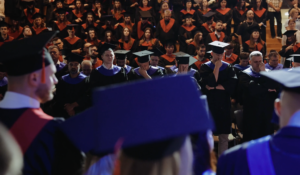
DENVER (BP)–An attorney representing three Utah polygamists wants to see the state’s ban on polygamy overturned in federal court, and he’s using many of the same arguments used by “gay marriage” supporters in the process.
Attorney Brian Barnard filed legal briefs with the U.S. 10th Circuit Court of Appeals in Denver earlier this year that were accepted formally by the court Sept. 25, the Associated Press reported.
Representing a man and two women, Barnard argues that Utah’s ban on polygamy violates their constitutional right to privacy, association and religion, AP said. He is relying heavily on the 2003 U.S. Supreme Court’s Lawrence v. Texas decision, which overturned anti-sodomy laws and is considered the biggest Supreme Court win ever for homosexual activists. Liberal groups eventually hope to use Lawrence as a stepping stone to legalizing “gay marriage” nationwide.
“The [Supreme Court] found no compelling state interest in criminalizing homosexual sodomy based on a long history of states and/or a majority of society finding the practice immoral,” Barnard wrote in his briefs, according to AP. “Similarly, the state of Utah can offer no compelling justification for criminalizing polygamy.”
Conservatives long have argued that, logically, “gay marriage” cannot be legalized without also legalizing polygamy, because the arguments used to advocate both are virtually identical. For instance, “gay marriage” advocates argue that preventing same-sex couples from “marrying” amounts to a form of legal discrimination. In his legal brief, Barnard made a similar assertion.
“Utah’s criminalization of religious polygamy, even if the crime is rarely prosecuted, brands plaintiffs as criminals and sanctions public and private discrimination based on plaintiffs’ religious based choice of marital relationship,” he wrote.
Homosexual activists typically have refused to embrace polygamy publicly, perhaps in part because of the perception that Americans oppose polygamy by larger majorities than they do “gay marriage.”
The case involves a couple already married who want to add a second “wife” to the relationship. They filed together for a marriage license in 2003 but were denied, AP said. They then sued, but lost at the federal district court before filing an appeal.
In her brief, Utah Assistant Attorney General Nancy Kemp said Utah’s marriage law doesn’t amount to religious discrimination because it applies evenly to everyone — religious and non-religious.
“Nothing in the statute suggests that it is to be applied only in the context of religiously motivated plural marriage, and, in fact, it has been applied outside the context of religion,” Kemp wrote, according to AP.
TENN. CHURCH TAKES STAND — A Southern Baptist church in Tennessee held a special Sunday night service Sept. 24 to support natural, traditional marriage and to encourage people to vote for that state’s proposed constitutional marriage amendment, which will be on the November ballot. Voter registration forms also were available, and state Rep. Debra Maggart, an amendment supporter, spoke.
“It is our desire to raise the public’s awareness of this vitally important amendment,” said Steve Nelson, pastor of Trinity Baptist Church in Hendersonville, which hosted the event. “We love all people and therefore cannot facilitate behavior that is personally and culturally harmful. God’s definition of marriage is clear. It is unfortunate that our society has come to the point where this most basic institution has to be constitutionally defined.”
Nelson said the issue is moral, not political.
“God’s Word clearly calls us to be salt and light in a world that is struggling to find purpose and direction,” he said. “As followers of Christ and His teachings, it is imperative that we lovingly take our values beyond church walls and out in the public square. That most certainly includes at the ballot box.”
The initiative, known as Amendment 1, would prevent state courts from legalizing “gay marriage” and prevent the state from recognizing out-of-state “gay marriages.” Massachusetts, which saw its highest court redefine marriage to include homosexuals, has no such amendment.
But a unique Tennessee law could prevent the amendment from passing, even if gets a majority of votes. The vote total for the amendment must be greater than half the votes cast in the governor’s race. For instance, if 2 million people vote in the gubernatorial race, then the amendment must get at least 1 million votes to pass. Amendment supporters say it is essential that conservatives vote for the amendment and not leave that portion of the ballot blank.
‘GAY MARRIAGE’ FOE DEFEATED — Massachusetts state Rep. Marie Parente, a Democrat who opposes “gay marriage” and supports a state marriage amendment, was defeated in the primary there Sept. 19. She lost to an opponent who favors “gay marriage.”
The Massachusetts legislature is scheduled to vote on a proposed marriage amendment in November, after the general election. While Parente will still be seated then, she will be gone during the next session — when the amendment must pass again if it is to appear on the ballot in 2008. The amendment essentially would reverse a decision by the state’s high court that legalized “gay marriage.”
The amendment must pass each time by at least 25 percent of the legislators. Conservatives say they are confident they have the votes this time around. Homosexual activists haven’t given up on this year’s vote, but they apparently also are focused on putting more of their allies in the legislature for next year. Parente was the only incumbent to lose, The Boston Globe reported. Nevertheless, homosexual activists claimed victory in several other primary races featuring open seats and said “they expect to pick up new supporters” for the new session, the Globe said.
–30–
For more information about the national debate over “gay marriage,” visit https://www.bpnews.net/samesexmarriage










